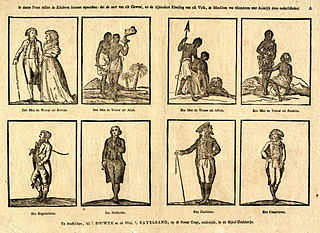Related Research Articles

Altruism is the principle and moral practice of concern for happiness of other human beings or other animals, resulting in a quality of life both material and spiritual. It is a traditional virtue in many cultures and a core aspect of various religious traditions and secular worldviews, though the concept of "others" toward whom concern should be directed can vary among cultures and religions. In an extreme case, altruism may become a synonym of selflessness, which is the opposite of selfishness.
Psychology is the science of mind and behavior. Psychology includes the study of conscious and unconscious phenomena, as well as feeling and thought. It is an academic discipline of immense scope. Psychologists seek an understanding of the emergent properties of brains, and all the variety of phenomena linked to those emergent properties, joining this way the broader neuro-scientific group of researchers. As a social science, it aims to understand individuals and groups by establishing general principles and researching specific cases.
Social psychology is the scientific study of how the thoughts, feelings, and behaviors of individuals are influenced by the actual, imagined, and implied presence of others, 'imagined' and 'implied presences' referring to the internalized social norms that humans are influenced by even when alone.

Social constructionism is a theory of knowledge in sociology and communication theory that examines the development of jointly constructed understandings of the world that form the basis for shared assumptions about reality. The theory centers on the notion that meanings are developed in coordination with others rather than separately within each individual.
Humanistic psychology is a psychological perspective that rose to prominence in the mid-20th century in answer to the limitations of Sigmund Freud's psychoanalytic theory and B. F. Skinner's behaviorism. With its roots running from Socrates through the Renaissance, this approach emphasizes the individual's inherent drive toward self-actualization, the process of realizing and expressing one's own capabilities and creativity.

In positive psychology, a flow state, also known colloquially as being inthe zone, is the mental state in which a person performing some activity is fully immersed in a feeling of energized focus, full involvement, and enjoyment in the process of the activity. In essence, flow is characterized by the complete absorption in what one does, and a resulting transformation in one's sense of time.

A personality test is a method of assessing human personality constructs. Most personality assessment instruments are in fact introspective self-report questionnaire measures or reports from life records (L-data) such as rating scales. Attempts to construct actual performance tests of personality have been very limited even though Raymond Cattell with his colleague Frank Warburton compiled a list of over 2000 separate objective tests that could be used in constructing objective personality tests. One exception however, was the Objective-Analytic Test Battery, a performance test designed to quantitatively measure 10 factor-analytically discerned personality trait dimensions. A major problem with both L-data and Q-data methods is that because of item transparency, rating scales and self-report questionnaires are highly susceptible to motivational and response distortion ranging all the way from lack of adequate self-insight to downright dissimulation depending on the reason/motivation for the assessment being undertaken.
Locus of control is the degree to which people believe that they, as opposed to external forces, have control over the outcome of events in their lives. The concept was developed by Julian B. Rotter in 1954, and has since become an aspect of personality psychology. A person's "locus" is conceptualized as internal or external.
Moral psychology is a field of study in both philosophy and psychology. Historically, the term "moral psychology" was used relatively narrowly to refer to the study of moral development. Moral psychology eventually came to refer more broadly to various topics at the intersection of ethics, psychology, and philosophy of mind. Some of the main topics of the field are moral judgment, moral reasoning, moral sensitivity, moral responsibility, moral motivation, moral identity, moral action, moral development, moral diversity, moral character, altruism, psychological egoism, moral luck, moral forecasting, moral emotion, affective forecasting, and moral disagreement.
The authoritarian personality is a personality type characterized by extreme obedience and unquestioning respect for and submission to the authority of a person external to the self, which is realized through the oppression of subordinate people. Conceptually, the term authoritarian personality originated from the writings of Erich Fromm, and usually is applied to men and women who exhibit a strict and oppressive personality towards their subordinates.
Self-monitoring is a concept introduced during the 1970s by Mark Snyder, that shows how much people monitor their self-presentations, expressive behavior, and nonverbal affective displays. Human beings generally differ in substantial ways in their abilities and desires to engage in expressive controls. It is defined as a personality trait that refers to an ability to regulate behavior to accommodate social situations. People concerned with their expressive self-presentation tend to closely monitor their audience in order to ensure appropriate or desired public appearances. Self-monitors try to understand how individuals and groups will perceive their actions. Some personality types commonly act spontaneously and others are more apt to purposely control and consciously adjust their behavior. Recent studies suggest that a distinction should be made between acquisitive and protective self-monitoring due to their different interactions with metatraits. This differentiates the motive behind self-monitoring behaviours: for the purpose of acquiring appraisal from others (acquisitive) or protecting oneself from social disapproval (protective).

In sociology, social psychology studies the relationship between the individual and society. Although studying many of the same substantive topics as its counterpart in the field of psychology, sociological social psychology places relatively more emphasis on the influence of social structure and culture on individual outcomes, such as personality, behavior, and one's position in social hierarchies. Researchers broadly focus on higher levels of analysis, directing attention mainly to groups and the arrangement of relationships among people. This subfield of sociology is broadly recognized as having three major perspectives: Symbolic interactionism, social structure and personality, and structural social psychology.

"Napoleon Complex" is a theorized inferiority complex normally attributed to people of short stature. It is characterized by overly-aggressive or domineering social behavior, such as lying about earnings, and carries the implication that such behavior is compensatory for the subject's physical or social shortcomings. In psychology, the Napoleon complex is regarded as a derogatory social stereotype.
In the field of social psychology, illusory superiority is a condition of cognitive bias wherein a person overestimates their own qualities and abilities, in relation to the same qualities and abilities of other people. Illusory superiority is one of many positive illusions, relating to the self, that are evident in the study of intelligence, the effective performance of tasks and tests, and the possession of desirable personal characteristics and personality traits.

In social psychology, a stereotype is an over-generalized belief about a particular category of people. It is an expectation that people might have about every person of a particular group. The type of expectation can vary; it can be, for example, an expectation about the group's personality, preferences, appearance or ability. Stereotypes are sometimes overgeneralized, inaccurate, and resistant to new information, but can sometimes be accurate.
Mark van Vugt is a Dutch evolutionary psychologist who holds a professorship in evolutionary psychology and work and organizational psychology at the VU University Amsterdam, the Netherlands. Van Vugt has affiliate positions at the University of Oxford, Institute for Cognitive and Evolutionary Anthropology (ICEA).

Optimism is an attitude reflecting a belief or hope that the outcome of some specific endeavor, or outcomes in general, will be positive, favorable, and desirable. A common idiom used to illustrate optimism versus pessimism is a glass filled with water to the halfway point: an optimist is said to see the glass as half full, while a pessimist sees the glass as half empty.

Kay Deaux is an American social psychologist known for her pioneering research on immigration and feminist identity. Deaux is Distinguished Professor Emerita at the Department of Psychology at the Graduate Center of the City University of New York (CUNY). According to Brenda Major, Deaux's work centers on the question of how social categories affect one's psychological makeup, social behavior, and life outcomes, while emphasizing the subjectivity of people's identities and experiences and the larger social context.
Intergroup relations refers to interactions between individuals in different social groups, and to interactions taking place between the groups themselves collectively. It has long been a subject of research in social psychology, political psychology, and organizational behavior.

Ozlem Nefise Ayduk is an American social psychologist at U.C. Berkeley researching close relationships, emotion regulation, and the development of self-regulation in children. She is a fellow at the Society of Experimental Social Psychology and the Society for Personality and Social Psychology. She has contributed content to several psychology handbooks, dictionaries, and encyclopedias.
References
- ↑ Bernice Pescosolido; Ronald Aminzade (22 March 1999). The Social Worlds of Higher Education: Handbook for Teaching in A New Century. SAGE Publications. pp. 91–. ISBN 978-0-7619-8613-3.
- ↑ Department of Psychiatry and Behavioral Sciences Stanford University School of Medicine Brant Wenegrat Associate Professor (7 September 2001). Theater of Disorder : Patients, Doctors, and the Construction of Illness: Patients, Doctors, and the Construction of Illness. Oxford University Press. pp. 22–. ISBN 978-0-19-534976-4.
- ↑ Eric Eich; John F. Kihlstrom; Gordon H. Bower; Joseph P. Forgas; Paula M. Niedenthal (28 July 2000). Cognition and Emotion. Oxford University Press, USA. pp. 109–. ISBN 978-0-19-535444-7.
- ↑ Noel Sheehy; Antony J. Chapman; Wendy A. Conroy (2002). Biographical Dictionary of Psychology. Taylor & Francis. pp. 532–. ISBN 978-0-415-28561-2.
- ↑ "Why Helping Others Makes Us Happy". Money - US News.
- ↑ Abraham P Buunk; Mark Van Vugt (15 November 2007). Applying Social Psychology: From Problems to Solutions. SAGE Publications. pp. 42–. ISBN 978-1-4462-2302-4.
- ↑ Abraham P Buunk; Mark Van Vugt (18 September 2013). Applying Social Psychology: From Problems to Solutions. SAGE Publications. pp. 55–. ISBN 978-1-4462-9287-7.
- ↑ "Helping others, helping ourselves". American Psychological Association.